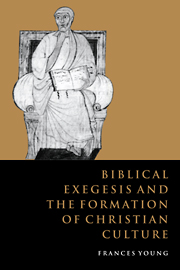Book contents
- Frontmatter
- Contents
- Preface
- List of abbreviations
- Introduction
- PART I EXEGESIS AND THE UNITY OF THE SCRIPTURES
- PART II THE BIBLE AS CLASSIC
- PART III LANGUAGE AND REFERENCE
- 6 Reference and cross-reference
- 7 The sacrament of language
- 8 Allēgoria and theōria
- 9 The question of method
- PART IV THE BIBLE AND THE LIFE OF FAITH
- Conclusion and retrospect: towards an outline historical account
- Bibliography
- 1 Index ofbiblicaI references
- 2 Index of modern scholars
- 3 Index of subjects
6 - Reference and cross-reference
Published online by Cambridge University Press: 02 December 2009
- Frontmatter
- Contents
- Preface
- List of abbreviations
- Introduction
- PART I EXEGESIS AND THE UNITY OF THE SCRIPTURES
- PART II THE BIBLE AS CLASSIC
- PART III LANGUAGE AND REFERENCE
- 6 Reference and cross-reference
- 7 The sacrament of language
- 8 Allēgoria and theōria
- 9 The question of method
- PART IV THE BIBLE AND THE LIFE OF FAITH
- Conclusion and retrospect: towards an outline historical account
- Bibliography
- 1 Index ofbiblicaI references
- 2 Index of modern scholars
- 3 Index of subjects
Summary
‘Interpretation’ meant much the same as ‘translation’ to the Greek who used the same word, hermeneia, for both. This remark is not irrelevant to the subject of this chapter, for it alerts us to an apparently commonsense feature of language which was taken for granted by the ancients. Language was assumed to refer to something other than itself: hence different verbal expressions might refer to the same things in such a way that words could be translated or interpreted by the substitution of a different form of expression. The meaning of language is in the idea behind the words, the reality to which the language refers.
Such a correspondence between logos and world, ideas and reality, has nowadays become problematic. Language and reality have become dissociated, especially in literary theory, but also in other philosophical movements. George Steiner, in Real Presences, has challenged this development. True, he admits, language is ‘infinite’: you can literally say what you like, and both myth and fiction demonstrate that language is far from merely representational. Steiner wonders, however, whether this infinity is the infinity of chaos or of transcendence, whether there is actually anything in what we say. The ancients recognised that the relationship between language and reality is complex, but without abandoning the connection. You might play something like ‘language-games’ but in the end they symbolised something, the signs were not simply a self-contained system since they signified, and were therefore significant.
- Type
- Chapter
- Information
- Biblical Exegesis and the Formation of Christian Culture , pp. 119 - 139Publisher: Cambridge University PressPrint publication year: 1997



